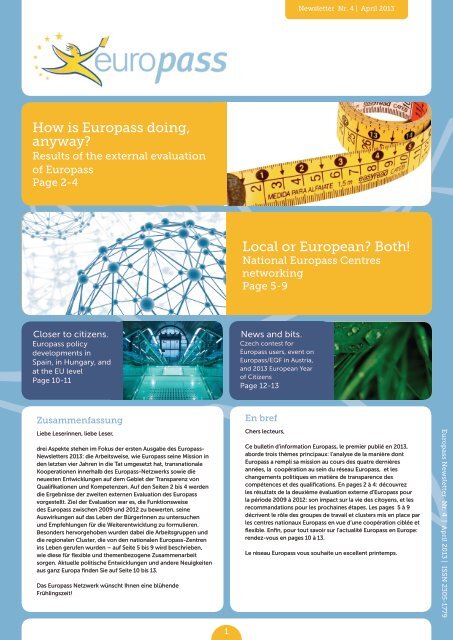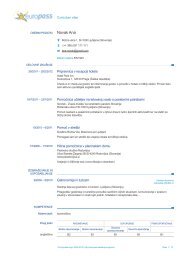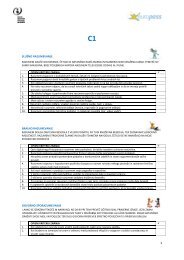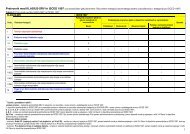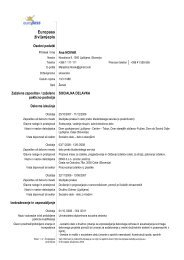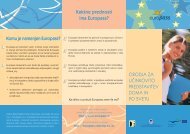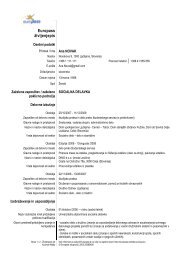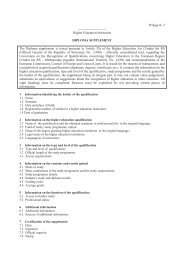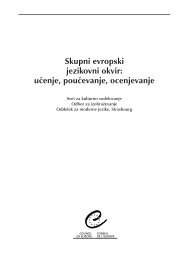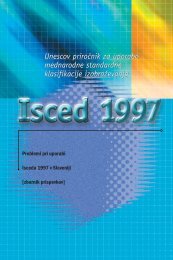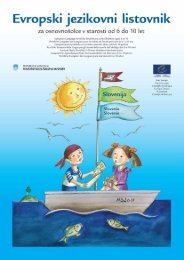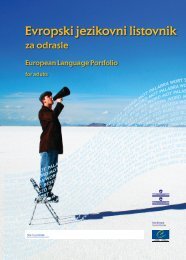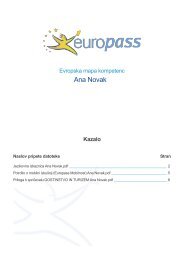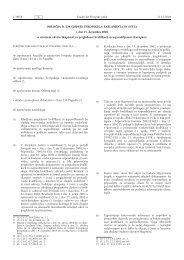Download - Europass
Download - Europass
Download - Europass
You also want an ePaper? Increase the reach of your titles
YUMPU automatically turns print PDFs into web optimized ePapers that Google loves.
Newsletter Nr. 4 | April 2013<br />
How is <strong>Europass</strong> doing,<br />
anyway<br />
Results of the external evaluation<br />
of <strong>Europass</strong><br />
Page 2-4<br />
Local or European Both!<br />
National <strong>Europass</strong> Centres<br />
networking<br />
Page 5-9<br />
Closer to citizens.<br />
<strong>Europass</strong> policy<br />
developments in<br />
Spain, in Hungary, and<br />
at the EU level<br />
Page 10-11<br />
News and bits.<br />
Czech contest for<br />
<strong>Europass</strong> users, event on<br />
<strong>Europass</strong>/EQF in Austria,<br />
and 2013 European Year<br />
of Citizens<br />
Page 12-13<br />
Zusammenfassung<br />
Liebe Leserinnen, liebe Leser,<br />
drei Aspekte stehen im Fokus der ersten Ausgabe des <strong>Europass</strong>-<br />
Newsletters 2013: die Arbeitsweise, wie <strong>Europass</strong> seine Mission in<br />
den letzten vier Jahren in die Tat umgesetzt hat, transnationale<br />
Kooperationen innerhalb des <strong>Europass</strong>-Netzwerks sowie die<br />
neuesten Entwicklungen auf dem Gebiet der Transparenz von<br />
Qualifikationen und Kompetenzen. Auf den Seiten 2 bis 4 werden<br />
die Ergebnisse der zweiten externen Evaluation des <strong>Europass</strong><br />
vorgestellt. Ziel der Evaluation war es, die Funktionsweise<br />
des <strong>Europass</strong> zwischen 2009 und 2012 zu bewerten, seine<br />
Auswirkungen auf das Leben der BürgerInnen zu untersuchen<br />
und Empfehlungen für die Weiterentwicklung zu formulieren.<br />
Besonders hervorgehoben wurden dabei die Arbeitsgruppen und<br />
die regionalen Cluster, die von den nationalen <strong>Europass</strong>-Zentren<br />
ins Leben gerufen wurden – auf Seite 5 bis 9 wird beschrieben,<br />
wie diese für flexible und themenbezogene Zusammenarbeit<br />
sorgen. Aktuelle politische Entwicklungen und andere Neuigkeiten<br />
aus ganz Europa finden Sie auf Seite 10 bis 13.<br />
Das <strong>Europass</strong> Netzwerk wünscht Ihnen eine blühende<br />
Frühlingszeit!<br />
En bref<br />
Chers lecteurs,<br />
Ce bulletin d’information <strong>Europass</strong>, le premier publié en 2013,<br />
aborde trois thèmes principaux: l’analyse de la manière dont<br />
<strong>Europass</strong> a rempli sa mission au cours des quatre dernières<br />
années, la coopération au sein du réseau <strong>Europass</strong>, et les<br />
changements politiques en matière de transparence des<br />
compétences et des qualifications. En pages 2 à 4: découvrez<br />
les résultats de la deuxième évaluation externe d’<strong>Europass</strong> pour<br />
la période 2009 à 2012: son impact sur la vie des citoyens, et les<br />
recommandations pour les prochaines étapes. Les pages 5 à 9<br />
décrivent le rôle des groupes de travail et clusters mis en place par<br />
les centres nationaux <strong>Europass</strong> en vue d’une coopération ciblée et<br />
flexible. Enfin, pour tout savoir sur l’actualité <strong>Europass</strong> en Europe:<br />
rendez-vous en pages 10 à 13.<br />
Le réseau <strong>Europass</strong> vous souhaite un excellent printemps.<br />
<strong>Europass</strong> Newsletter Nr. 4 | April 2013 | ISSN 2305-1779<br />
1
2<br />
Second external evaluation of <strong>Europass</strong><br />
The 2004 <strong>Europass</strong> Decision foresees that every four years, the Commission shall<br />
assess the implementation of the initiative, based on an evaluation carried out by an<br />
independent body. A first evaluation was made in 2008. In March 2012, the Commission<br />
carried a second evaluation of <strong>Europass</strong>. Final report was delivered in March 2013.<br />
The purpose of the evaluation was to analyse the role and tasks of <strong>Europass</strong> and its different documents within<br />
the European policy framework with particular focus on the period of 2009-2012 and to suggest future <strong>Europass</strong><br />
developments. To achieve these goals, the evaluation team conducted desk research, national and European level<br />
interviews, and four surveys – of representatives of National <strong>Europass</strong> Centres, national <strong>Europass</strong> stakeholders,<br />
international <strong>Europass</strong> stakeholders, and actual and potential individual end-users of <strong>Europass</strong> documents. The latter<br />
survey had over 17 000 respondents from all <strong>Europass</strong> countries.<br />
Findings<br />
According to evaluation findings, <strong>Europass</strong> was a highly successful European initiative with direct reach and effects<br />
on European citizens and residents. It was strongly embedded within EU<br />
strategic policy framework for education and training and has become ever<br />
more relevant to its intended users and stakeholders. The related European<br />
transparency and mobility tools and initiatives are complementary and<br />
coherent with <strong>Europass</strong>, although full synergies with EQF, ECVET and<br />
ESCO were yet to be achieved.<br />
The success of <strong>Europass</strong> is evidenced by a sharp rise in the awareness, use<br />
and appreciation of <strong>Europass</strong> documents (particularly <strong>Europass</strong> CV) for<br />
their professional look, international recognition and convenience. Overall<br />
<strong>Europass</strong> documents increased the transparency of skills and qualifications<br />
and positively influenced international and domestic mobility alike.<br />
“According to evaluation<br />
findings, <strong>Europass</strong> is highly<br />
successful European<br />
initiative with direct reach<br />
and effects on<br />
European citizens and<br />
residents.”<br />
Despite great advances, the <strong>Europass</strong> Diploma Supplement and Certificate<br />
Supplement were still unknown by many of their intended users –<br />
comprehensive coverage of their large target groups will take years of<br />
sustained progress. Planned developments in <strong>Europass</strong>, including the European Skills Passport (a portfolio to document<br />
the skills and competences listed in the CV) for all documents, the <strong>Europass</strong> Experience (a record of skills acquired for<br />
instance during a summer job, a placement or a period in a NGO) and the new ICT module (a self-assessment tool for IT<br />
basic skills) in the <strong>Europass</strong> CV are welcomed by National <strong>Europass</strong> Centres, stakeholders and users.<br />
Recommendations<br />
<strong>Europass</strong> has been a generally well-run initiative apart from some gaps in the monitoring arrangements.<br />
Monitoring should be efficiently resourced and more systematic use of quantified targets should be pursued. Other<br />
recommendations urged responsible organisations to review layout, design and content of <strong>Europass</strong> documents on a<br />
regular basis so that the documents remain contemporary and attractive to users (note from the editor: the <strong>Europass</strong><br />
website and CV have been completely redesigned in December 2012). National <strong>Europass</strong> Centres in co-operation with<br />
national stakeholders should look for alternative ways of reaching disadvantaged individuals lacking computer skills<br />
and/or experience in documenting and presenting their skills and qualifications.<br />
The <strong>Europass</strong> Mobility and Youth Pass could be subsumed within the newly developed <strong>Europass</strong> Experience. The<br />
implementation of the EQF, ECVET, ECTS, ESCO, and the activities of Euroguidance could be closely followed by<br />
<strong>Europass</strong> centres serving the citizens. Better convergence could be sought between <strong>Europass</strong>, EURES and other<br />
relevant portals (e.g. PLOTEUS, see page 11 below) for the users to access all useful tools related to their transparency<br />
and mobility needs through a one-stop shop. Where possible national governments should place National <strong>Europass</strong><br />
Centres (if they are not already placed) within the national organisations running other European programmes,<br />
initiatives and centres related to transparency and comparability of qualifications and skills.<br />
<strong>Europass</strong> has to be maintained as a European initiative and adequate funding as well as availability of matching national<br />
co-financing is necessary to guarantee its sustainability. The evaluation team also recommended an increase of funding<br />
for promotion of <strong>Europass</strong> so that its documents could reach even greater numbers of their potential users faster and<br />
bring them the benefits of greater transparency and comparability of qualifications and skills.<br />
Donatas Pocius and Rimantas Dumcius | Public Policy and Management Institute, Lithuania<br />
<strong>Europass</strong> Newsletter Nr. 4 | April 2013 | ISSN 2305-1779
Evaluation results: selected evidence on<br />
the use and relevance of <strong>Europass</strong><br />
The level of awareness and use of <strong>Europass</strong> documents has steadily increased since the last evaluation<br />
in 2008. The number of visits to the <strong>Europass</strong> website reflects an increasing knowledge and usage of the<br />
<strong>Europass</strong> documents, as shown by the table below: between 2006 and 2012 visits to the <strong>Europass</strong> website<br />
have increased by 419.4%.<br />
Increase in visits to the <strong>Europass</strong> website between 2006 and 2011<br />
Year Total Visits % Increase<br />
2006 3 098 532 -<br />
2007 4 713 154 48.6%<br />
2008 6 047 691 31.3%<br />
2009 7 487 763 23.8%<br />
2010 10 091 597 34.8%<br />
2011 12 993 978 28.8%<br />
2006-2011 - 419.4%<br />
End-users reported they use <strong>Europass</strong> documents most often for job applications and traineeships / internships -<br />
43.6% and 40.5% respectively. Convenience, recognition and reliability are the main reasons for using the <strong>Europass</strong><br />
documents.<br />
Compared to the first evaluation in 2008, the <strong>Europass</strong> documents became more relevant to the job-seekers by 2012.<br />
A significant rise in the attributed relevance was reported mainly for the <strong>Europass</strong> Language Passport, the <strong>Europass</strong><br />
Mobility and the <strong>Europass</strong> Certificate Supplement, suggesting that <strong>Europass</strong> were better serving the specific needs of<br />
job-seekers. No significant change is reported by users concerning the <strong>Europass</strong> Diploma Supplement.<br />
Relevance of <strong>Europass</strong> documents to job-seekers, 2008 - 2012<br />
100%<br />
90%<br />
80%<br />
70%<br />
60%<br />
50%<br />
40%<br />
30%<br />
20%<br />
10%<br />
0%<br />
_____________________________<br />
_____________________________<br />
_____________________________<br />
_____________________________<br />
_____________________________<br />
_____________________________<br />
_____________________________<br />
_____________________________<br />
_____________________________<br />
_____________________________<br />
_____________________________<br />
<strong>Europass</strong> CV <strong>Europass</strong> LP <strong>Europass</strong> MD <strong>Europass</strong> DS <strong>Europass</strong> CS<br />
Second evaluation 2012<br />
First evaluation 2008<br />
<strong>Europass</strong> Newsletter Nr. 4 | April 2013 | ISSN 2305-1779<br />
3
4<br />
<strong>Europass</strong> documents also proved to be useful to other stakeholders, e.g. businesses and employers’ associations, trade<br />
unions, educational institutions, public administration, public and private employment services, volunteer organisations,<br />
etc. Stakeholders pointed out the usefulness of <strong>Europass</strong> documents to:<br />
- present individual knowledge, skills and qualifications in a clear way;<br />
- compare individual competences between countries and sectors;<br />
- make selection processes easier for employers and/or educational institutions.<br />
Usefulness of <strong>Europass</strong> documents as assessed by stakeholders:<br />
Survey Questions<br />
<strong>Europass</strong><br />
Document<br />
% of stakeholders<br />
that agree to a<br />
moderate, large or<br />
very large extent<br />
ECV 78.8%<br />
ELP 70.0%<br />
Countries<br />
ECS 58.8%<br />
To what extent, in<br />
your view, has the<br />
<strong>Europass</strong> document<br />
made the competences<br />
of individuals more<br />
comparable across:<br />
EDS 62.8%<br />
EM 57.6%<br />
ECV 70.8%<br />
ELP 58.8%<br />
Sectors<br />
ECS 52.8%<br />
EDS 52.8%<br />
EM 53.6%<br />
ECV 75.6%<br />
ELP 66.4%<br />
To what extent, in your<br />
view, has the following<br />
<strong>Europass</strong> document<br />
made the candidate<br />
selection process easier<br />
for:<br />
Employers<br />
Educational<br />
Institutions<br />
ECS 54.0%<br />
EDS 56.4%<br />
EM 52.8%<br />
ECV 60.4%<br />
ELP 55.6%<br />
ECS 49.2%<br />
EDS 56.8%<br />
EM 47.2%<br />
Summary<br />
Overall, the <strong>Europass</strong> initiative was very effective over the period between 2008 and 2012, as proven by increased use<br />
and awareness of <strong>Europass</strong> documents. Each document also proved to be successful at least in three ways (albeit to<br />
a varying extent). First, they were useful for presenting individual knowledge, skills and qualifications in a clear way.<br />
Second, all <strong>Europass</strong> documents were successful in making the individual competences more comparable across<br />
countries and across sectors. Finally, they were helpful in making the candidate selection processes for employers and<br />
educational institutions easier.<br />
The analysis also revealed that further development of layout, design and content of <strong>Europass</strong> documents is necessary<br />
to increase the success by better meeting the newly emerging needs of users. Several foreseen changes in <strong>Europass</strong><br />
such as the introduction of ‘<strong>Europass</strong> Experience’, a new ICT module in the <strong>Europass</strong> CV, and a new structure of the<br />
documents in a form of European Skills Passport were viewed positively while others, such as the suggestion to extend<br />
the Diploma Supplement for doctorates, lacked comprehensive support.<br />
The texts, tables and charts on pages 3 and 4 were compiled and adapted from: European Commission and PPMI (2013),<br />
Second Evaluation of <strong>Europass</strong>. Final Report.<br />
<strong>Europass</strong> Newsletter Nr. 4 | April 2013 | ISSN 2305-1779
Local or European Both!<br />
National <strong>Europass</strong> Centres networking in work groups and regional clusters<br />
<strong>Europass</strong> is a European initiative governed at the EU level but brought to the citizens at the level of<br />
states according to national programmes and reflecting different socio-economic settings. Currently,<br />
there are 32 National <strong>Europass</strong> Centres (NECs) in the network, 27 in EU Member States and 5 in<br />
candidate countries and the countries of the European Economic Area and the European Free Trade<br />
Area.<br />
To establish a flexible middle ground between the European dimension and the national<br />
particularities, the NECs can choose to become members of transnational work groups and regional<br />
clusters. Whereas work groups serve to NECs as platforms for topic-based initiatives such as the<br />
development of the current and new <strong>Europass</strong> documents or pooling resources for<br />
promotion and dissemination activities, the regional clusters reflect the geographical,<br />
social and cultural proximity of certain NECs, strengthen regional reciprocity and<br />
enable effective sharing of good implementation practices.<br />
The following pages introduce these sub-units of the <strong>Europass</strong> network and give<br />
overview of their objectives and outcomes. 6 work groups and 4 regional clusters are<br />
or were in operation within the <strong>Europass</strong> network:<br />
Susanna Kärki<br />
NEC FI, Helsinki,<br />
January 2013<br />
Indira von Oven<br />
NEC NL, Helsinki,<br />
January 2013<br />
Work groups (WG)<br />
WG Communication and Promotion<br />
WG Certificate Supplement<br />
WG <strong>Europass</strong> Mobility/Experience<br />
WG Inland mobility/Volunteering<br />
WG Twinning<br />
WG Skills Passport and e-Portfolios<br />
(to be started in May 2013)<br />
Regional clusters (RC)<br />
RC Central Europe<br />
RC Mediterranean<br />
RC Nordic-Baltic<br />
RC Nordic-Baltic West<br />
Meeting of the chairs of work groups in Helsinki,<br />
January 2013. From left: Dik van der Wal – NEC NL,<br />
Špela Pogačnik Nose – NEC SI, Susanna Kärki – NEC FI,<br />
Alexandra Enzi – NEC AT, Indira von Oven – NEC NL,<br />
Frazer Wallace – NEC UK, Mads Flyvholm – NEC DK<br />
Work Group on Communication and Promotion<br />
Member NECs<br />
Current chair<br />
Austria, Belgium (French speaking community), Croatia,<br />
Denmark, Estonia, Finland, Hungary, Latvia, Macedonia,<br />
Poland, Portugal, Slovenia, Spain<br />
Austria, Denmark, Finland<br />
Active from October 2010<br />
Last meeting December 2012<br />
Next meeting May 2013<br />
The mission of this work group is to support the communication and promotion of <strong>Europass</strong> to citizens and organisations by sharing<br />
NECs’ best practises and combining resources towards joint initiatives. The WG has served for more than two years now as a platform<br />
for the exchange and pooling of experience, ideas and information. It has produced and administered the common European<br />
Facebook profile of the <strong>Europass</strong> initiative, and created a joint promotion video available on Youtube. The future objective of the WG is<br />
to continue developing shared promotional materials and to further enhance the presence of <strong>Europass</strong> in social media.<br />
Facebook<br />
YouTube<br />
<strong>Europass</strong> Newsletter Nr. 4 | April 2013 | ISSN 2305-1779<br />
5
6<br />
Work Group on <strong>Europass</strong> Certificate Supplement<br />
Member NECs<br />
Current chair<br />
Belgium (Flemish speaking community), Czech Republic,<br />
Finland, Germany, Hungary, Liechtenstein, Lithuania,<br />
Netherlands, Norway, Portugal, Romania, Slovenia<br />
Netherlands<br />
Active from January 2011<br />
Last meeting October 2012<br />
Next meeting May 2013<br />
<strong>Europass</strong> certificate supplement *<br />
1. Title of the certificate (NL)<br />
Ervaringsbewijs: podiumtechnicus (m/v)<br />
In the original language<br />
BELGIUM / FLANDERS<br />
The work group was established to raise awareness of the <strong>Europass</strong> Certificate<br />
Supplement among a variety of stakeholders, and to improve the quality and<br />
transparency of the document.<br />
2. Translated title of the certificate<br />
Certificate of professional competence: performing arts technician (m/f) (EN)<br />
Titre de compétence professionnelle: régisseur de spectacle (h/f) (FR)<br />
This translation has no legal status.<br />
3. Profile of skills and competences<br />
The occupational standard was developed and approved by the sectoral social partners.<br />
The holder of the certificate of professional competence can:<br />
install technical stage equipment:<br />
‣ work according the requirements of the technical documentation and the environmental factors;<br />
‣ select microphones, cables and lanterns based on the technical documentation;<br />
‣ fit up technical equipment in a logical order;<br />
‣ connect technical equipment ensuring it functions, the cables are not twisted and the connections can be traced;<br />
‣ fit up spotlights, cloths, props and sound equipment on the fly bars, ensuring the maximum distributed load and point load is not exceeded;<br />
‣ secure all items on the fly bar with a safety cable that is strong enough to secure the weight, minimises the fall height and doesn’t obstruct the moving parts;<br />
‣ place a ballet floor ensuring it is flat, well stretched, and the strips join perfectly.<br />
setup technical stage equipment:<br />
‣ focus a profile spot with a maximum light output;<br />
‣ program a digital light board according to the technical documentation;<br />
‣ setup the sound on a sound desk with tone control, so voices are well understood in the auditorium and no feedback occurs;<br />
‣ determine the place of the masking (legs and borders);<br />
‣ setup a beamer for projection and back projection from a laptop, so the image is sharp and the edges of the projection fit the screen.<br />
operate technical stage equipment:<br />
‣ follow visual and verbal cues;<br />
‣ ensure light cues are adapted to the live performance;<br />
‣ provide an alternative to the failure of a particular lantern in order to have a similar result;<br />
‣ adjust the sound on a sound desk with tone control, when something is not well understood or when feedback occurs;<br />
‣ provide an alternative to the failure of a microphone or monitor in order to have a similar result;<br />
‣ operates the fly bars with an agreed speed to the corresponding dead marks.<br />
Explanatory note<br />
This document is designed to provide additional information about the specified certificate and does not have any legal status in itself. The<br />
format of the description is based on the following texts: Council Resolution 93/C 49/01 of 3 December 1992 on the transparency of<br />
qualifications, Council Resolution 96/C 224/04 of 15 July 1996 on the transparency of vocational training certificates, and Recommendation<br />
2001/613/EC of the European Parliament and of the Council of 10 July 2001 on mobility within the Community for students, persons<br />
undergoing training, volunteers, teachers and trainers.<br />
More information available at: http://europass.cedefop.europa.eu<br />
© European Communities 2002<br />
The group conducted an international series of stakeholder surveys inquiring about<br />
the relevance and usage of the Certificate Supplement in private companies as well as<br />
public institutions. The members of the group have also exchanged experience with the<br />
development of digital solutions for the management of the document through online<br />
database systems.<br />
As a next step, the group will review the common<br />
guidelines for the creation of Certificate<br />
Supplements to increase the transparency and<br />
usability of the document as well as its distribution<br />
mechanisms.<br />
1<br />
Version April 2010<br />
Work Group on <strong>Europass</strong> Mobility/Experience<br />
Member NECs<br />
Current chair<br />
Active from 2012<br />
Austria, Hungary, Netherlands, Poland, Portugal, Slovenia<br />
Netherlands, Slovenia<br />
Last meeting October 2012<br />
Next meeting May 2013<br />
Drawing on lessons learned in the implementation of the <strong>Europass</strong> Mobility document<br />
on both transnational and country level, the purpose of this work group is to support<br />
the launch and operation of the upcoming new<br />
document: <strong>Europass</strong> Experience (EX). EX will<br />
record the skills and competences acquired<br />
through periods of formal as well as non-formal<br />
learning, working or volunteering.<br />
The group has been conducting comparative<br />
analysis of the differences in the practices of, and<br />
the needs related to, issuing and using <strong>Europass</strong><br />
Mobility in various countries. The analysis is used<br />
to inform the development of the <strong>Europass</strong> Experience template, as well as to improve<br />
the implementation of the current <strong>Europass</strong> Mobility instruments. The group will also<br />
consult the creation and testing of an online application for the management of EX and<br />
Mobility.<br />
Bergen Institute of Technology<br />
Alexis Papadopoulos<br />
born on 12 June 1986, held the position of<br />
Clinical Research Assistant<br />
from 20/01/2012 to 30/06/2012 (total: 6 months), at<br />
<strong>Europass</strong> Experience<br />
A record of knowledge and skills<br />
The Bergen Institute of Technology Study Centre for the Visually<br />
Impaired Students (SZS), Bergen, Germany<br />
KNOWLEDGE AND SKILLS GAINED<br />
▪ Positive Developments in Psychosocial Intervention Research<br />
▪ New Developments in Non-Pharmacological Interventions<br />
▪ Using Technology to Support Social Engagement in People with Dementia<br />
▪ Interventions to Promote Well-being for People with Dementia and their Caregivers<br />
▪ Behavioral Alternatives to Anti-Psychotic Prescribing for People with Dementia<br />
ACTIVITIES AND RESPONSIBILITIES<br />
▪ Positive Developments in Psychosocial Intervention Research<br />
▪ New Developments in Non-Pharmacological Interventions<br />
▪ Using Technology to Support Social Engagement in People with Dementia<br />
▪ Interventions to Promote Well-being for People with Dementia and their Caregivers<br />
▪ Behavioral Alternatives to Anti-Psychotic Prescribing for People with Dementia<br />
DOCUMENT ISSUED BY<br />
Dr B. Hoffman<br />
Director<br />
+39 445123456<br />
bernard.hoffman@beritec.univ-bergen.de<br />
<strong>Europass</strong> Newsletter Nr. 4 | April 2013 | ISSN 2305-1779<br />
Explanatory note: The EU is not responsible or liable with regard to the content of this document. In order to<br />
verify the electronic signature of the document, visit https://europass.cedefop.europa.eu/ex/GR-123456798<br />
ISSUED ON<br />
30/06/2012<br />
DOC. REFERENCE<br />
GR-123456798<br />
© European Communities, 2012 | http://europass.cedefop.europa.eu | page 1 / 2
Work Group on Inland Mobility (<strong>Europass</strong> Mobility for volunteers)<br />
Member NECs<br />
Current chair<br />
Belgium (French speaking community), Netherlands,<br />
Poland, United Kingdom<br />
Netherlands<br />
Active from January 2011<br />
Last meeting October 2012<br />
Next meeting ...<br />
Originally, the <strong>Europass</strong> Mobility document was designed for the purposes of<br />
recording skills and competences gained through international mobility. This work<br />
group introduced the concept of adapting the use of <strong>Europass</strong> Mobility for recording<br />
the learning outcomes acquired through domestic mobility<br />
periods as well. The idea was piloted in the Netherlands<br />
and the United Kingdom with young people gaining first<br />
work experience in voluntary work placements in their<br />
own country. Particularly in the Netherlands, the initiative<br />
was very successful among the volunteers as well as the<br />
organizations involved, as demonstrated in a video clip<br />
created by the group. Another result of the group’s work<br />
http://youtube.com/F3c-k5LloGY<br />
was the development of an online tool for completing the<br />
<strong>Europass</strong> Mobility document. This instrument has been used<br />
to consult similar developments for the new <strong>Europass</strong> documents: European Skills Passport and <strong>Europass</strong><br />
Experience. Due to a shared focus with the WG on Mobility/Experience, the two groups will now merge to<br />
pool resources and join future efforts.<br />
Work Group on Twinning<br />
Member NECs<br />
Current chair<br />
Germany, Malta, Netherlands, Portugal<br />
None - work completed<br />
Active from March 2011<br />
Last meeting June 2012<br />
Next meeting ...<br />
The objective of the Twinning WG, whose activities were concluded in 2012, was to<br />
share experienced NECs’ knowledge with NECs that were starting up their activities. The<br />
main proceeding of the group is a online<br />
good-practice guide: a collection of<br />
examples of best practices in <strong>Europass</strong><br />
implementation from around Europe for<br />
all NECs to use as inspiration and source<br />
of learning.<br />
The guide has been made available on the<br />
internet and will be regularly updated and<br />
extended.<br />
www.proalv.pt/Eventos/<strong>Europass</strong>/<br />
Best_Practices/index.html<br />
<strong>Europass</strong> Newsletter Nr. 4 | April 2013 | ISSN 2305-1779<br />
7
8<br />
Regional Cluster Central Europe<br />
Member NECs<br />
Current chair<br />
Austria, Croatia, Czech Republic, Hungary, Italy, Poland,<br />
Slovenia<br />
Croatia<br />
Active from 2010<br />
Last meeting June 2012<br />
Next meeting June 2013<br />
The Central European Regional Cluster has been recently focusing on the<br />
cooperation between <strong>Europass</strong> and other European networks in the areas of<br />
education, training and employment support. For this purpose, the meeting of<br />
the cluster was co-organized with Eures and<br />
Euroguidance of Slovenia and attended by<br />
their representatives. A cluster meeting is a<br />
unique opportunity for the member NECs to<br />
engage in detailed discussions about their<br />
experiences with the implementation of<br />
each of the <strong>Europass</strong> documents, and to find<br />
solutions to common challenges.<br />
The NEC representatives get to know each other better and thus cooperate more dynamically. In the future, the cluster intends to<br />
continue on working closely together particularly on the topics of promotion of <strong>Europass</strong>, survey-based analysis of the benefits the<br />
<strong>Europass</strong> documents bring to the citizens, and putting forward proposals for revamping <strong>Europass</strong> documents in accord with the new<br />
CV and the recently introduced European Skills Passport.<br />
Regional Cluster Mediterranean<br />
Member NECs<br />
Current chair<br />
Cyprus, Greece, Italy, Portugal, Spain<br />
Joint<br />
Active from April 2011<br />
Last meeting October 2012<br />
Next meeting May 2013<br />
The Mediterranean Regional Cluster was established to exchange experience and good practices between the member NECs,<br />
especially taking into account the geographic and cultural proximity as well as the continuous mobility of workers and students that<br />
exists between the countries in the Mediterranean area.<br />
The main activities of the cluster focus on the <strong>Europass</strong> CV, an instrument that<br />
proves extremely popular among the citizens of Southern Europe.<br />
The results of the cluster’s work include elaboration of an online manual providing<br />
user-friendly guidelines on the completion of the new <strong>Europass</strong> CV template; a<br />
promotion poster highlighting the advantages of the CV; an international mobile<br />
phone video competition for the CV users.<br />
<strong>Europass</strong> Newsletter Nr. 4 | April 2013 | ISSN 2305-1779
Regional Cluster Nordic/Baltic<br />
Member NECs<br />
Current chair<br />
Denmark, Estonia, Finland, Iceland, Latvia, Lithuania,<br />
Norway, Sweden<br />
Joint<br />
Active from 2006<br />
Last meeting August 2012<br />
Next meeting September 2013<br />
While the general objective of this longstanding cluster remains in peer<br />
learning among the member NECs from the Nordic and Baltic areas<br />
of Europe, the specific recent focus has been put on improvements in<br />
administrative structures of the NECs as well as on the conjunction of<br />
<strong>Europass</strong> and the European Credit System in Vocational Education and<br />
Training (ECVET).<br />
The member NECs have learned much from each other over the<br />
existence of this cluster platform, facilitated the ways for disseminating<br />
information to citizens through joint publications and promotional<br />
material, and established transnational contacts with relevant<br />
institutions and stakeholders.<br />
Regional Cluster Nordic/Baltic West<br />
Member NECs<br />
Current chair<br />
Belgium (all communities), Denmark, Estonia, Finland,<br />
Germany, Iceland, Latvia, Lithuania, Luxembourg,<br />
Netherlands, Norway, Sweden, United Kingdom<br />
Lithuania<br />
Active from August 2008<br />
Last meeting May 2012<br />
Next meeting March 2013<br />
This cluster is in its nature a “cluster of clusters” where colleagues from different regional clusters meet. The cooperation, initially<br />
launched by NEC Germany, was joined eventually by a number of countries not strictly determined in terms of region but in terms<br />
of productive diversity and added value. The current concern of the group is the strengthening of quality management within the<br />
<strong>Europass</strong> network in general and improving the effectiveness<br />
and efficiency of cluster and work group meetings in<br />
particular.<br />
Another topic of the cluster is observing productive<br />
cooperation between <strong>Europass</strong> and other European and<br />
national policies (the validation of non-formal and informal<br />
learning, EQF, ECVET, ESCO). As the main benefit of clustering,<br />
the members see the opportunity for national <strong>Europass</strong><br />
representatives to get directly involved in latest developments<br />
and decisions on matters relevant for the European dimension<br />
of the implementation of <strong>Europass</strong>.<br />
<strong>Europass</strong> Newsletter Nr. 4 | April 2013 | ISSN 2305-1779<br />
9
10<br />
Policy developments<br />
<strong>Europass</strong> and Spanish regions: a model of cooperation and coordination<br />
Spain is not a classical Federation but a highly decentralized unitary state that has devolved powers to the communities, which in turn<br />
exercise their right to self-government within the limits set forth in the Constitution. Currently, there are 17 Autonomous Communities<br />
and 2 Autonomous Cities (Ceuta and Melilla) that are collectively known as “Autonomies”.<br />
“We must take advantage<br />
of the benefit that working<br />
as a network implies. We are<br />
sure that this is the best way<br />
to attract new users to<br />
<strong>Europass</strong>”<br />
distributing tasks and resolving<br />
possible technical problems<br />
that may arise. “We must take advantage of the benefit that working as a network<br />
implies. We are sure that this is the best way to attract new users to <strong>Europass</strong>”,<br />
says Fernando Pascual, <strong>Europass</strong> representative in the Autonomous Community of<br />
Madrid.<br />
In order to maintain effective communication, we have created a “blog”, which<br />
is our gathering point to keep each other informed and updated. Each <strong>Europass</strong><br />
representative can insert information that he/she wishes to share with other<br />
regional reference points. “We managed to create a network at national and<br />
regional level following the example of the <strong>Europass</strong> Virtual Community at the<br />
European level”, says Pablo Franco from the Autonomous Community of Valencia.<br />
The National <strong>Europass</strong> Centre in Spain maintains a very close relationship with the<br />
Autonomous Communities. Each region has appointed a <strong>Europass</strong> representative<br />
to carry out information, dissemination and promotion of the tool. Collaboration<br />
between the Spanish NEC and the regions is essential to make <strong>Europass</strong> a success at<br />
national level.<br />
This steady cooperation is translated into an ongoing exchange of information and<br />
good practices, joint events and publications and idea-sharing. All this is coordinated<br />
under the direction of the Spanish NEC, located in Madrid, which is in charge of<br />
centralizing the information,<br />
updating relevant background,<br />
“We managed to create a<br />
network at national and<br />
regional level following the<br />
example of the <strong>Europass</strong><br />
Virtual Community at the<br />
European level”<br />
Besides our contacts along these lines, the network established<br />
two working committees with a work agenda focused on <strong>Europass</strong><br />
documents and their upcoming developments. The committee<br />
meetings usually also include topics such as synergies between<br />
<strong>Europass</strong> and other tools for mobility, e.g. EURES, Eurodesk or<br />
Euroguidance, and transparency instruments such as ECTS, ECVET<br />
and EQF. As María Pascual from Catalunya says, “most of us work as<br />
advisors in European educational programmes in the Departments of<br />
Education of the Autonomous Communities, so we are certainly the<br />
key stakeholders to promote all these tools in synergy”.<br />
We should particularly highlight the role played by the Autonomous<br />
Communities in the validation of the <strong>Europass</strong> Mobility documents. In this regard, they are responsible for checking and reviewing the<br />
EM documents generated by LLP programmes they have promoted and, finally, validating and registering them.<br />
NEC Spain would like to thank the entire team<br />
that takes part in the Spanish regional network<br />
for their relentless effort and cooperation to<br />
promote and disseminate <strong>Europass</strong> in their busy<br />
daily work.<br />
Sadia Khokhar | NEC Spain<br />
Visits from Spain<br />
to the <strong>Europass</strong><br />
website<br />
(2005 – 2013)<br />
ECVs and ELPs<br />
completed online<br />
in Spanish;<br />
Castilian<br />
(2005 – 2013)<br />
Documents<br />
downloaded in<br />
Spanish; Castilian<br />
(2005 – 2013)<br />
4 521 633 1 798 517 3 126 654<br />
Source: Cedefop, http://europass.cedefop.europa.eu;<br />
state of play February 2013<br />
<strong>Europass</strong> Newsletter Nr. 4 | April 2013 | ISSN 2305-1779
Exploring synergies between European tools:<br />
Survey on PLOTEUS and EQF Portals<br />
The recent external periodic evaluation of <strong>Europass</strong> concluded, inter alia, that “better convergence could be sought between <strong>Europass</strong>,<br />
EURES, EQF, ESCO and other relevant portals (e.g. PLOTEUS - The Portal on learning opportunities throughout the European space)<br />
for the users to access all useful tools related to their transparency and mobility needs through a one-stop shop,” (see page 2 above).<br />
To explore the usability of related European information services, the European Commission, Directorate General for Education and<br />
Culture recently commissioned a survey on user consultation of the PLOTEUS and the EQF Portal. 3s Unternehmensberatung, together<br />
with ICF GHK, are conducting the survey asking current and potential users about their information needs and satisfaction with the<br />
portals. Questions are asked about the information and services provided by the portals, about the usability and functionality of the<br />
websites, and the options for future developments.<br />
The purpose of the survey is to collect the users’ views on the EQF Portal – a platform that brings together information on the<br />
implementation of the European Qualifications Framework (EQF) and how member states have linked their qualifications to this<br />
common framework – and on PLOTEUS, which aims to help students, job seekers, workers, parents, guidance counsellors and<br />
teachers to find information about studying in Europe. The results of the questionnaires will contribute to improving and further<br />
developing the PLOTEUS and EQF portals towards better functionality and cooperation between related European tools and initiatives.<br />
If you would like to participate in the survey for the EQF portal, please follow this link: EQF. For the survey on PLOTEUS, please click<br />
at PLOTEUS. The questionnaires are available in English, French, German, Italian, Portuguese and Spanish, and the surveys are online<br />
from 20 March until the end of April 2013.<br />
If you have any questions with regard to the survey, please do not hesitate to contact the project manager at ziegler@3s.co.at.<br />
Petra Ziegler | 3s Unternehmensberatung GmbH, Vienna<br />
Make your CV work!<br />
Hungarian NEC surveys employers’ views on the <strong>Europass</strong> CV<br />
The National <strong>Europass</strong> Centre Hungary launched a survey in the autumn 2012 about the reputation and the usage of the <strong>Europass</strong> CV<br />
from the employers’ point of view. HR specialists in different companies were asked, involving various sectors and company sizes from<br />
SMEs to multinationals. Altogether, 62 companies replied. 98% of the respondents were familiar with the <strong>Europass</strong> CV format even<br />
though they were not asking for it specifically when recruiting new workers.<br />
On average, 42% of the CVs received by companies were in the <strong>Europass</strong><br />
format, and based on the experience of the HR specialists the tendency is<br />
increasing. Almost 60% of the companies liked the format.<br />
The survey also asked the respondents about specific pros and cons of the<br />
<strong>Europass</strong> CV. They mostly felt positively about the structure which helps jobseekers<br />
not to leave out any important information. As for the challenges with<br />
the format, the following views were recorded: the language reference system<br />
might be too complicated for some companies; the level of detail in the CV is<br />
high, which can make the document too long; the standardised structure may<br />
sideline users’ individual input.<br />
Another section of the survey dealt with typical mistakes made in CVs. It was<br />
confirmed that the <strong>Europass</strong> format was effective in supporting a comprehensive information value of CVs. The format also ensures<br />
that the level of language knowledge is included, and that previous work experience is described with the relevant information on<br />
activities and responsibilities. More than a half of the HR specialists affirmed that the personal skills and competences section is a good<br />
source of topics for personal interviews. However, another 40% of the respondents warned against filling this section with general<br />
stereotypes such as “good team-player”.<br />
As regards HR specialists’ recommendations for the future development of the <strong>Europass</strong> CV, they would welcome more examples of<br />
completed CVs on the <strong>Europass</strong> websites, as well as increasing the flexibility of the format. The respondents supported putting the<br />
name of the employer before main tasks and responsibilities in the work experience section: one of the changes brought about by the<br />
new <strong>Europass</strong> CV. More orientation on work results within the description of experience was recommended, as were more individual<br />
focus and precision in filling personal skills and competences.<br />
These statements and results refer to the old format of the <strong>Europass</strong> CV as the survey was conducted in the autumn 2012. It will be<br />
interesting to launch another survey about the new CV format, and to explore how the changes are perceived by employers.<br />
Csilla Szabo | Tempus Public Foundation / NEC Hungary<br />
Lessons from the Hungarian employer survey:<br />
• The <strong>Europass</strong> CV structure will inspire you. It<br />
will also help you organise your inspiration.<br />
• Choose appropriate level of detail. Keep your<br />
CV to-the-point and accurate.<br />
• Beware of general phrases and stereotypes.<br />
• Make sure to promote concrete outcomes of<br />
your work or study.<br />
• Give the reader something they will want to<br />
hear more about in an interview.<br />
• Be you. That’s who gets the job.<br />
<strong>Europass</strong> Newsletter Nr. 4 | April 2013 | ISSN 2305-1779<br />
11
12<br />
News<br />
An essay contest supports promotion of <strong>Europass</strong> in the Czech Republic<br />
As a part of its promotional activities, the National <strong>Europass</strong> Centre Czech Republic organized in November 2012 an essay contest<br />
named „How did <strong>Europass</strong> help you to get a job, volunteer work or internship abroad“ The contest that ran until January 2013 was<br />
aimed at making <strong>Europass</strong> usage visible in the media through collecting the experiences of international internship participants and<br />
their authentic reflexions on the use of <strong>Europass</strong> documents.<br />
NEC CZ promoted the contest by a digital leaflet containing a link to an online questionnaire. The contest call was published on the<br />
NEC’s website, on its Facebook page, in a press release released in December 2012, and through articles that appeared in the media.<br />
The participants were asked to give details about themselves and their foreign internship, the organisations involved, about their first<br />
contact with <strong>Europass</strong> and about the way <strong>Europass</strong> had helped them before, during or after their international mobility experience and<br />
in their further professional and personal life.<br />
The contest’s home page was viewed by some 500 unique visitors, about<br />
30 of whom decided to take active part, even though not all of them met<br />
the contest terms. Approximately half of those involved attached photos<br />
from their internship to the questionnaire. NEC CZ was thus able to<br />
collect quite a few interesting quotes that will be cited as authentic user<br />
reflexions in this season’s informational outputs and promotional articles.<br />
For example, in response to the question „Why did you use the <strong>Europass</strong><br />
document“, 25-year-old Petra Stehlíková, who completed a four-month<br />
internship in Germany in 2011, answered: „I found the document very<br />
illustrative and well structured. The information provided by my host<br />
University on the skills I had gained was made conveniently available to<br />
other parties through <strong>Europass</strong>.“<br />
The winner of the contest, 33-year-old teacher Jiří Šedivý who completed<br />
a five-month internship in Turkey last year, summarised the positive impact<br />
of the internship on his professional career: „The stay in Turkey helped me<br />
realise that one shouldn’t have to become just another narrow-minded<br />
Mr Jiří Šedivý, a Czech teacher during his internship in a school<br />
in Turkey; the winner of the <strong>Europass</strong> contest.<br />
teacher. With the European initiatives, including <strong>Europass</strong>, it is possible to travel and get to know countries all over the world, to<br />
compare perspectives and gain deeper insights. The internship has strongly enhanced my motivation for further development and<br />
progress in my teaching practice.“<br />
The winning contribution was rewarded with an educational board game called “Europe: Questions & Answers”, and all participants<br />
received a set of promotional items. In principle a mapping and awareness-raising activity, the contest has also contributed to<br />
establishing new co-operation modes between NEC CZ and a number of associated online initiatives that will certainly continue<br />
through similar projects in the coming years.<br />
Lucie Šnajdrová | NEC Czech Republic<br />
Transparency in educational and career guidance: <strong>Europass</strong> and the<br />
European Qualifications Framework<br />
On 28 May 2013, <strong>Europass</strong> Austria will organise an event in cooperation with Euroguidance Austria and the Coordination Point for the<br />
National Qualifications Framework. The half-day workshop will target at practitioners and stakeholders engaged in educational and<br />
career guidance.<br />
The objective of the event is to provide a practical overview on the Euroguidance initiative and the European transparency instruments<br />
represented by <strong>Europass</strong> and the European Qualifications Framework (EQF). After a general overview, a series of parallel workshops<br />
will provide the participants with the opportunity to obtain in-depth information on the potential and the development of the EQF<br />
and the National Qualifications Framework (NQF) in Austria. This will be followed by a discussion on the implementation of the NQF<br />
in educational and career guidance counseling, giving the participants the opportunity to voice their needs and expectations. As an<br />
outcome of the event, the participants will have the means to apply the information in their daily consultancy work.<br />
The programme and registration form can be found on the website of the Austrian Lifelong Learning Agency.<br />
Alexandra Enzi | NEC Austria<br />
<strong>Europass</strong> Newsletter Nr. 4 | April 2013 | ISSN 2305-1779
2013 is the European Year of Citizens<br />
One of the principle objectives of <strong>Europass</strong> is to support citizens in the pursuit of their right to be mobile and to seek learning and<br />
work opportunities across the European Union. As European citizens we have a number of other distinctive rights. Now we have a<br />
chance to learn more about them and debate them, too.<br />
„We need the direct involvement of citizens in building a stronger and more political Union. That is why 2013 is the European Year of<br />
Citizens – a year dedicated to you and your rights as Europeans,“ said Vice-President Viviane Reding, the EU‘s Justice Commissioner.<br />
„Union citizenship is more than a concept. It is a practical reality that brings tangible benefits to citizens. The European Commission<br />
wants to help people understand how they can directly benefit from their rights and listen to their views about where Europe is headed.<br />
European citizens’ must be able to voice their concerns and prepare the ground for future European elections. It‘s time we all took<br />
ownership of our common future.“<br />
To mark the European Year of Citizens 2013, a range of events, conferences and<br />
seminars will be organised across the EU at Union, national, regional or local level<br />
(see the calendar of events here). The Commission will also strengthen the visibility<br />
of the multilingual Europe Direct and Your Europe web portals as key elements of<br />
a ‚one-stop-shop‘ information system on Union citizens‘ rights, as well as the role<br />
and visibility of problem solving tools, such as SOLVIT, to allow Union citizens to<br />
better make use of and defend their rights.<br />
European Year of Citizens 2013<br />
www.europa.eu/citizens-2013<br />
Throughout the year 2013, Vice-President Reding and other EU Commissioners<br />
will join forces with national and local politicians to hold debates with citizens<br />
all across Europe – to listen to them and answer their questions. Vice-President<br />
Reding has already held debates in Cadiz (Spain), Graz (Austria) and Berlin<br />
(Germany) and Commissioner Andor held a debate in Naples (Italy). Many more will<br />
European Year of Citizens 2013<br />
www.europa.eu/citizens-2013<br />
be held throughout European municipalities in 2013 and will see European and local political decision makers engage in a debate with<br />
citizens from all walks of life across the whole EU. Follow all the debates here.<br />
To prepare the ground for the European Year, the Commission held a broad public consultation between 9 May and 9 September 2012<br />
asking citizens what problems they have encountered in exercising their rights as EU citizens (see IP/12/461). Respondents made clear<br />
that they are very attached to their EU rights – especially free movement and political rights. They would like to see a true European<br />
area in which they can live, work, move, study and shop without facing red tape or discrimination. But they also pointed out that there<br />
is still some way to go. They highlighted various problems, notably in getting EU rights respected at local level – issues which the<br />
Commission will be taking up in the next EU Citizenship Report, planned during 2013. See the results here.<br />
Source of the text: European Commission, 2013, Press release: European Commission kick-starts the 2013 European Year of Citizens.<br />
Take a look at the previous editions of the <strong>Europass</strong> Newsletter, too!<br />
<strong>Europass</strong> Newsletter Nr. 1, May 2012<br />
(Main story: <strong>Europass</strong> at the interface of education and labour market)<br />
<strong>Europass</strong> Newsletter Nr. 2, September 2012<br />
(Main story: European tools and principles for skills and qualifications)<br />
<strong>Europass</strong> Newsletter Nr. 3, December 2012<br />
(Main story: <strong>Europass</strong> 2012 – 2014: What is going to change)<br />
The <strong>Europass</strong> Newsletter has been produced by 3s Unternehmensberatung<br />
on behalf of the European Commission.<br />
©European Union, 2013<br />
Reproduction is authorised, provided the source is acknowledged.<br />
The information and views set out in this publication are those of the author(s) and do not necessarily<br />
reflect the official opinion of the European Union. Neither the European Union institutions and bodies<br />
nor any person acting on their behalf may be held responsible for the use which may be made of the<br />
information contained therein.<br />
http://europass.cedefop.europa.eu<br />
<strong>Europass</strong> Newsletter Nr. 4 | April 2013 | ISSN 2305-1779<br />
13


